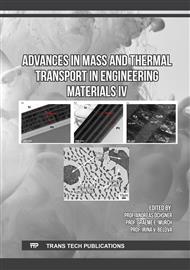[1]
Y.S. Jin, X. Xu, S.H. Zhu, L. Xiang, Design and Test of 15:1 GO2/Kerosene Variable-Thrust Rocket Engine, Journal of Propulsion Technology, 39(2018) 2438-2445.
Google Scholar
[2]
P. Cui, Q. Li, P. Cheng, L. Chen, System scheme design for LOX/LCH4 variable thrust liquid rocket engines using motor pump, ACTA ASTRONAUTICA, 171(2020) 139-150.
DOI: 10.1016/j.actaastro.2020.03.002
Google Scholar
[3]
J. Martin, W. Armbruster, R. Stützer, S. General, B. Knapp, D. Suslov, J. Hardi, Flame characteristics of a high-pressure LOX/H2 rocket combustor with large optical access - ScienceDirect, Case Studies in Thermal Engineering, 28(2021) 101546.
DOI: 10.1016/j.csite.2021.101546
Google Scholar
[4]
C. Li, W. Zuo, W. Wen, X. Zeng, Z. Ouyang, Overview of the Chang'e-4 Mission: Opening the Frontier of Scientific Exploration of the Lunar Far Side, SPACE SCIENCE REVIEWS, 217(2021).
DOI: 10.1007/s11214-021-00793-z
Google Scholar
[5]
K. Malaya, R.N. Annavarapu, Master Catalogue of Lunar and Mars Exploration Missions, (2021).
Google Scholar
[6]
G.P. Sutton, H.S. Seifert, Rocket Propulsion Elements, PHYSICS TODAY, 3(1956).
Google Scholar
[7]
F.V. Pelevin, A.V. Ponomarev, A regenerative cooling system for the chamber of a liquid-propellant rocket engine with interchannel coolant flow through a metal mesh, Space Engineering and Technology, (2021) 65-77.
DOI: 10.33950/spacetech-2308-7625-2020-4-65-77
Google Scholar
[8]
P. Cui, Q. Li, P. Cheng, B. Zhang, A comparative study of system schemes for LOX /LCH4 expander cycle liquid rocket engine, Journal of National University of Defense Technology, 42(2020) 106-115.
Google Scholar
[9]
P. Marco, The status of the research on the heat transfer deterioration in supercritical fluids: A review, INTERNATIONAL COMMUNICATIONS IN HEAT AND MASS TRANSFER, 95(2018) 132-138.
DOI: 10.1016/j.icheatmasstransfer.2018.04.006
Google Scholar
[10]
J. Haemisch, D. Suslov, M. Oschwald, Experimental Study of Methane Heat Transfer Deterioration in a Subscale Combustion Chamber, JOURNAL OF PROPULSION AND POWER, 35(2019) 819-826.
DOI: 10.2514/1.b37394
Google Scholar
[11]
M. Zhang, B. Sun, Mechanism and influence factor analysis of heat transfer deterioration of transcritical methaneDOI: 10.1002/er.5614, INTERNATIONAL JOURNAL OF ENERGY RESEARCH, 44(2020) 9050-9063.
DOI: 10.1002/er.5614
Google Scholar
[12]
J. Haemisch, D. Suslov, M. Oschwald, Experimental and Numerical Investigation of Heat Transfer Processes in Rocket Engine Cooling Channels Operated with Cryogenic Hydrogen and Methane at Supercritical Conditions, Transactions of the Japan Society for Aeronautical and Space Sciences, Aerospace Technology Japan, 19(2021) 96-105.
DOI: 10.2322/tastj.19.96
Google Scholar
[13]
M. Zhang, B. Sun, Improved heat-transfer correlation for transcritical methane based on a velocity profile correction term, Journal of Thermal Science and Engineering Applications, 14(2021) 1-29.
DOI: 10.1115/1.4051509
Google Scholar
[14]
H. Li, Z. Ru, Z. Zou, S. Zhou, Investigation on Heat Transfer Characteristic of Supercritical Methane in a Microtube, Journal of Nanjing University of Aeronautics and Astronautics, 53(2021) 513-520.
Google Scholar
[15]
R. Votta, F. Battista, V. Salvatore, M. Pizzarelli, G. Leccese, F. Nasuti, S. Meyer, Experimental investigation of transcritical methane flow in rocket engine cooling channel, APPLIED THERMAL ENGINEERING, 101(2016) 61-70.
DOI: 10.1016/j.applthermaleng.2015.12.019
Google Scholar
[16]
L. Marco, P. Marco, N. Francesco, Analysis of thermal stratification impact on the design of cooling channels for liquid rocket engines, INTERNATIONAL JOURNAL OF HEAT AND MASS TRANSFER, 135(2019) 811-821.
DOI: 10.1016/j.ijheatmasstransfer.2019.02.028
Google Scholar
[17]
B. Sun, M. Zhang, M. Zhang, J. Yuan, Coupled numerical analysis of variable cross-section cooling channels in LOX/Methane rocket engines, HEAT TRANSFER RESEARCH, 51(2020) 1181-1196.
DOI: 10.1615/heattransres.2020029990
Google Scholar
[18]
J. Haemisch, D. Suslov, G. Waxenegger-Wilfing, K. Dresia, M. Oschwald, LUMEN - Design of the Regenerative Cooling System for an Expander Bleed Cycle Engine Using Methane, 7th International Space Propulsion Conference, 2021.
Google Scholar


